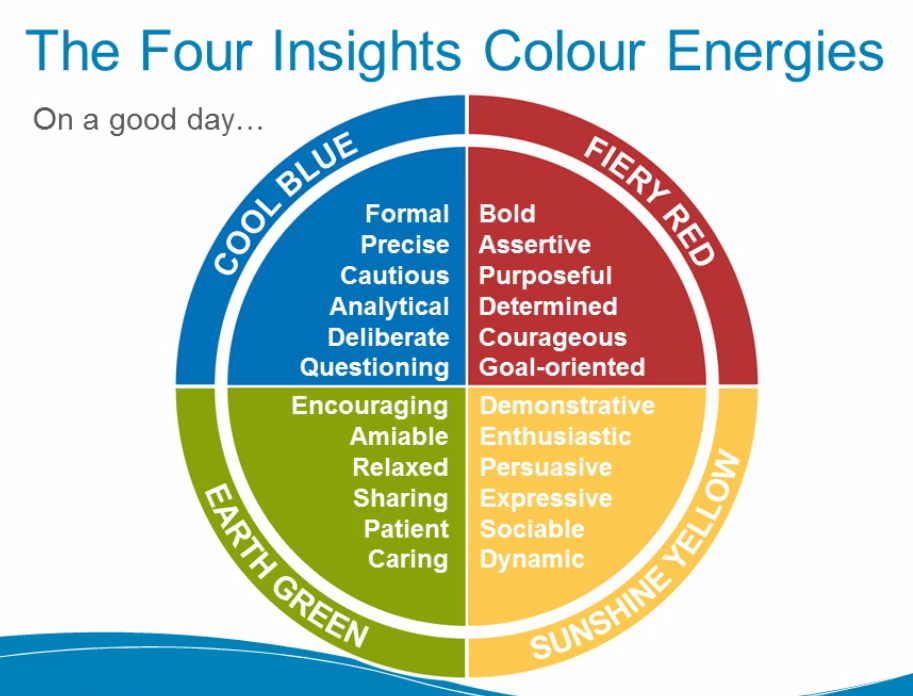Most are made up and silly.
The only one I’ve liked was in college I did a “communication style” one. Where it showed a bunch of different like emails, posts, and conversations and asked which you preferred to receive and which you were likely to write.

10 years later I still think about it, cause the goal of the work was to talk about how if you’re a certain communication style what to keep in mind with communicating with others. Like tips to not get frustrated with yellows who don’t care about facts when sending emails and how to write emails that don’t bore and frustrate people if you’re blue. (I’m blue green. I can sometimes write long emails)
I thought about it the other day cause a guy was complaining about all these emails that didn’t seem to say anything, they were just about feeling good, and he just wanted them to spit it out. Which corresponded to firey red getting mad at green.
So with that context, do you have any that actually had an impact on you?
I enjoy the D&D alignment chart.
I should’ve just said my result is “Chaotic Good” at that corporation “team-building” personality test workshop
I really got a lot out of the Myres Briggs when I was younger. I know its not scientifically valid, and it’s stupid of folks take it too seriously, but it really helped young me understand that other people weren’t wrong/dumb/weird for approaching things differently. And it helped me understand some of the axis on which difference can lie in a helpful way.
I think in the post internet age people are very aware of different categories and identities, but growing up in the previous millenium it wasn’t something that we talked about much. The introvert / extrovert division is overblown and overly simplistic nowadays, but before people use to just criticise each other for being “too shy” or “too loud” like there was a “normal” way to be that everyone should get.
The big five is certainly more reliable and scientifically supported, but I never found that it helped me understand a coworker or friend better. Partly I think conscientiousness and neuroticism sound a little too value laden. People can happily self describe as “detail orientated” (Sensing) or “big picture types” (Intuitive) but nobody really wants to say “I’m closed-off and unconscientious”. And I think that’s why MB has been popular in business / organisation worlds, because it’s a useful way to get people discussing themselves and how they approach problems. It doesn’t matter that in reality my level of extraversion varies depending on the context, or I’m Judging in certain tasks but Perceiving in others.
MBTI, DISC, and love languages work well together. Even if there’s no hard proof, it at least gets your thinking about the fact that other people think differently. It’s very easy to live in your own head and make assumptions, so getting exposed to these concepts in a formal way can be really effective in building relationships of all kinds.
I don’t need a test to tell me what my personality is. I’m literally me practically every day.
The love language test in part because it was a great way to start a conversation about our romantic needs with my spouse.
The ones for autism :•|
I’m kind of a fan of the True Colors system but not because I “believe it”. More so that I just like that it makes you stop and consider how other people you’re interacting with might consider your behaviors and vice versa.
- green: independent thinkers (logic driven, efficient, analytical)
- gold: pragmatic planners (organized, responsible, respect rules and authority)
- orange: action-oriented (short term changes, adventurous, impulsive)
- blue: people-oriented (sympathetic, emotion driven, seeks harmony in groups)
Our exercise at work first required you to classify yourself, then everyone else voted to classify you. So you could get a picture of how you can see yourself compared to how others see you.
I think what helps the most for facilitating the conversation is that it groups traits that are similar under a single color, so you can quickly say “I’m gold, I think this other person is green”, then start diving into how one set of actions might be perceived by the other, etc. We didn’t take a personality test. We just went straight in with “here’s what I think I am”, so there’s no questionnaire pigeonholing you into something you might not identify with.
It helped me interact with my co-worker (and close friend outside of work), because he’s very impulse driven and constantly spitting out 200 line proof-of-concept things. But they’re messy and buggy and don’t have any safety rails and all kinds of other things. Where as I’m much more analytical, filing code changes to him for things like considering null inputs in fields, or to fix spelling mistakes (that one is more anal than analytical, but whatev).
By doing this classification exercise, we were able to see beyond “dude wtf are you doing you look at all this wrong stuff” and we’re able to consider how each of us worked was causing stress for the other. By realizing that and incorporating it to our work we were able to stop getting bogged down in arguments of really specific things and could stay focused on the general problem we were trying to solve.
My favorite part of the whole exercise when we did it at work was all of our managers said that they are Blue (considerate of others feelings, etc) where as everyone that reported to them said they were Gold (organized, respect authority), like ruthlessly Gold, and sometimes with a hint of Orange because they change focus of the team every time a new “issue” comes up before we’d finished resolving the open ones. It made me realize that management isn’t intentionally shitty. They’re just delusional to the point that they don’t even see how their actions are nothing like their intentions.
Most typological approaches to personality are BS. Take Meyers Briggs as an example. If you are 51% extroverted, you are an extrovert, supposedly having more in common with someone who scored 100% on that same metric than an “introvert” who scored 49% on that metric.
None really work, generally, but all try to make you think about the various factors involved and how other people might approach things differently from you, which is why they can be helpful:-).
So they’re helpful but they don’t work?
Most personality tests will not tell you anything about yourself that you didn’t already know, it will not give you any insights into the correct way to live your life or what is going to work for you.
However, it can help you frame things about yourself in a new light or to help you come to understand the way that you work inside of a larger social picture.
So they don’t work to tell you who you are, but they help you be who you can be.
I have done many.
“Helpful” needs to be defined. In my younger life it helped me to find out about my personality. Later it also helped to understand other people.
Sometimes these tests gave contradicting results, so I learned that these results can never be taken 100% literally. You have to decide what to take from it and what to leave.
MBTI was the first one that fully admitted this, and that book even explained how these things change when you get older. So I consider this the most helpful one.
The strongest one IMHO was the Enneagram. But also most hard to understand.
The most scary one (and in retrospect, the most funny one) was at Scientology. It helped me to understand what a bunch that is and how they can catch people.
Strengths Finder was scary accurate for me
I had to do that one and it was no where close. It’s funny how that stuff works.
OCEAN is useful.
For fun but also interesting because it is a piece of history? The four temperaments (Hippocrates).
I used to have a job that was really into the Core Value Index. I thought it was pretty awesome because their categories were really simple and there are only 4 so you can really wrap your head around the whole thing at once.
It’s not a full personality test, it’s more focused on trying to answer the question “How do you want ideas presented to you?” And. “How do you prefer to interpret ideas?” I found myself making meanful changes in how I worked with coworkers where I knew their results, which isn’t something anyone can manage with more complicated tests.
The one that confirmed I should talk to a psychiatrist about a possible ADHD diagnosis.
Nope, they are all made up recruiting companies to try and justify their ridiculous fees.
Requiring personality tests is just admitting that you are socially incompetent.






